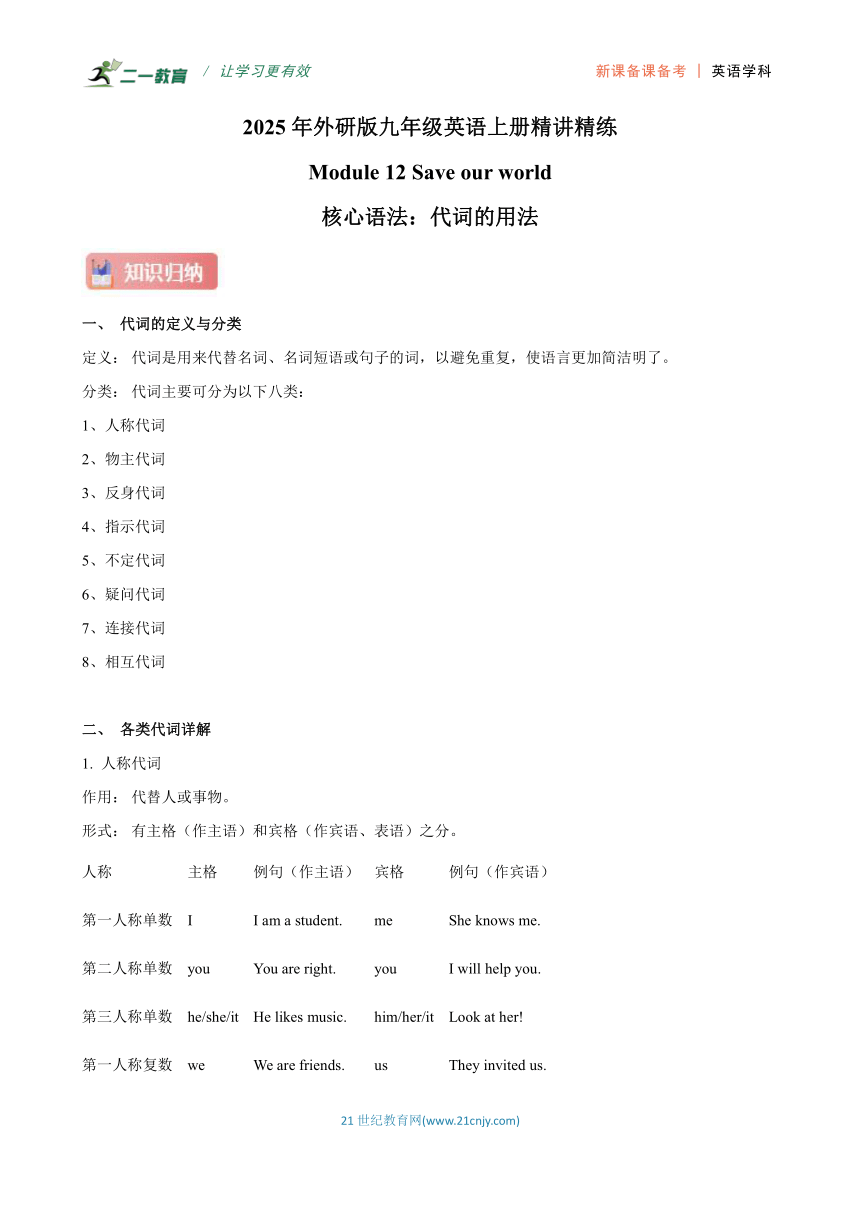
/ 让学习更有效 新课备课备考 | 英语学科 2025年外研版九年级英语上册精讲精练 Module 12 Save our world 核心语法:代词的用法 一、 代词的定义与分类 定义: 代词是用来代替名词、名词短语或句子的词,以避免重复,使语言更加简洁明了。 分类: 代词主要可分为以下八类: 1、人称代词 2、物主代词 3、反身代词 4、指示代词 5、不定代词 6、疑问代词 7、连接代词 8、相互代词 二、 各类代词详解 1. 人称代词 作用: 代替人或事物。 形式: 有主格(作主语)和宾格(作宾语、表语)之分。 人称 主格 例句(作主语) 宾格 例句(作宾语) 第一人称单数 I I am a student. me She knows me. 第二人称单数 you You are right. you I will help you. 第三人称单数 he/she/it He likes music. him/her/it Look at her! 第一人称复数 we We are friends. us They invited us. 第二人称复数 you You are students. you I miss you. 第三人称复数 they They are playing. them Wait for them. 2. 物主代词 作用: 表示所属关系,“谁的”。 形式: 有形容词性(后接名词)和名词性(后不接名词)之分。 人称 形容词性 例句 名词性 例句 第一人称单数 my This is my book. mine This book is mine. 第二人称单数 your Is this your pen yours The pen is yours. 第三人称单数 his/her/its His bike is new. his/hers/its The new bike is his. 第一人称复数 our Our classroom is big. ours The big classroom is ours. 第二人称复数 your Your books are here. yours These books are yours. 第三人称复数 their They are in their room. theirs The room is theirs. 3. 反身代词 作用: 表示动作反射回执行者本人,或起强调作用。 形式: 人称 反身代词 第一人称单数 myself 第二人称单数 yourself 第三人称单数 himself/herself/itself 第一人称复数 ourselves 第二人称复数 yourselves 第三人称复数 themselves 用法: 作宾语(反射动作): Please help yourself to some fish. (请随便吃些鱼。) 作同位语(起强调作用): I myself fixed the computer. (我自己修好了电脑。) 固定搭配: enjoy oneself(玩得开心), teach oneself(自学), by oneself(独自地) 4. 指示代词 作用: 指示或标识人或事物。 常见词: this(这个), that(那个), these(这些), those(那些) 用法: 指代距离: This is my apple. That is yours. (这是我的苹果。那是你的。) 指代时间: These days we are very busy. (这些天我们很忙。) 避免重复: The weather in Beijing is colder than that in Guangzhou. (北京的天气比广州的(天气)冷。) 5. 不定代词 作用: 不明确指代特定的人或事物。 重要不定代词辨析: 代词 用法 例句 some / any some 用于肯定句;any 用于否定句和疑问句 I have some questions. Do you have any questions I don't have any questions. many / much many 修饰可数名词;much 修饰不可数名词 many books, much water few / a few few(几乎没有,表否定);a few(一些,表肯定) He has few friends. (他没什么朋友。) He has a few friends. (他有一些朋友。) little / a little little(几乎没有,表否定);a little(一点,表肯定) There is little milk left. (没剩多少牛奶了。) There is a little milk left. (还剩一点牛奶。) both / either / neither both(两者都);either(两者中任一);neither(两者都不) Both are good. You can take either. Neither of them is correct. all / none all(三者及以上都);none(三者及以上都不) All of us are here. None of the answers is ... ...
~~ 您好,已阅读到文档的结尾了 ~~